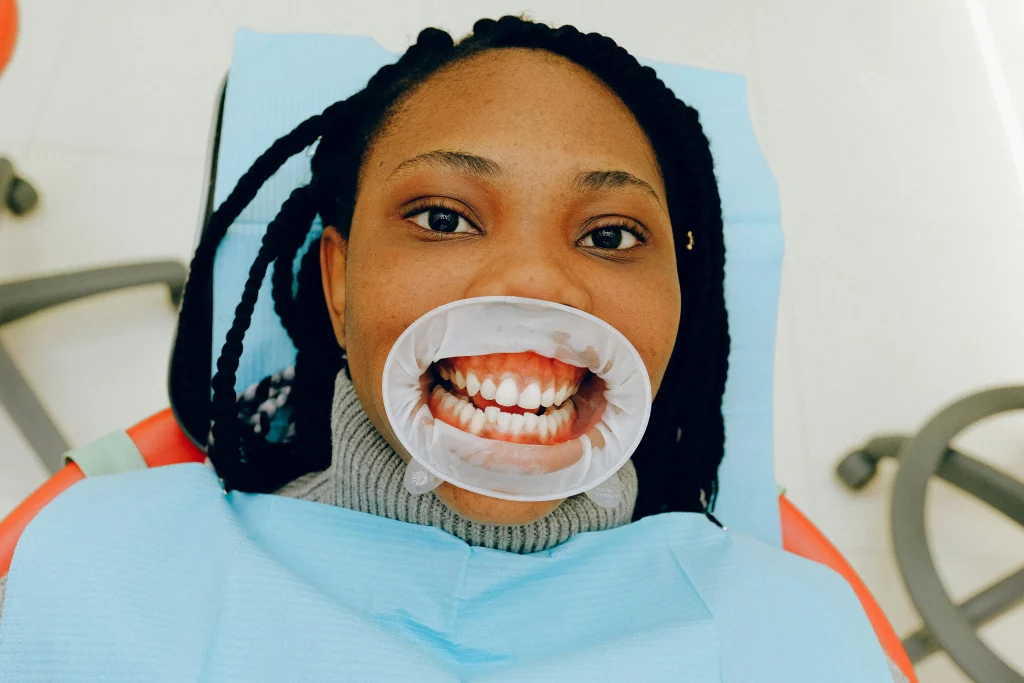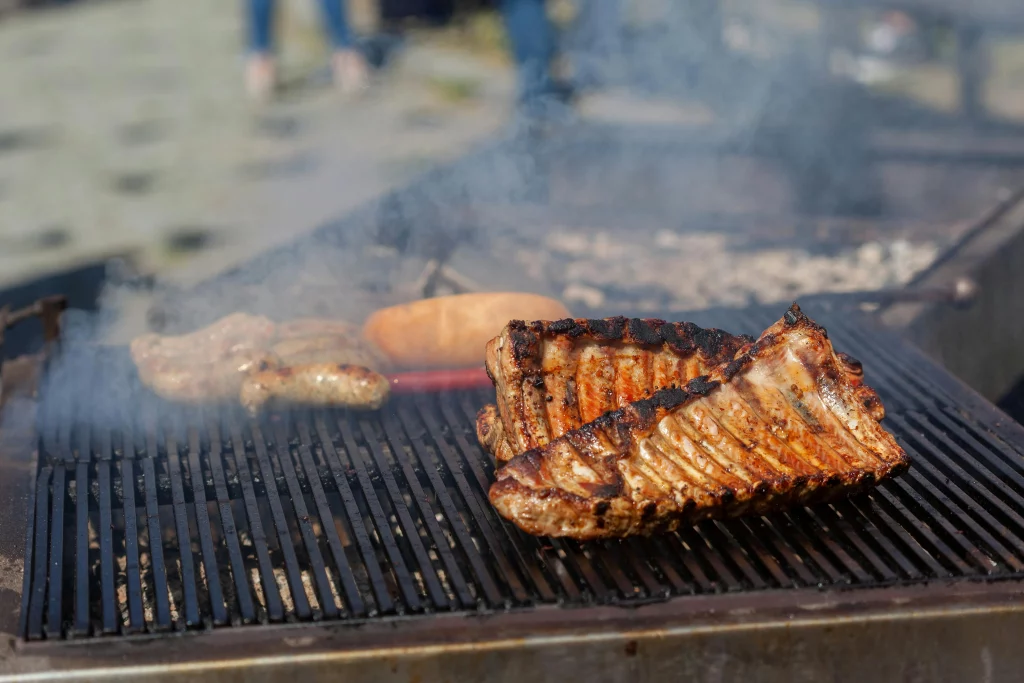Summer is here, and so is BBQ season, now’s the perfect time to enjoy your grilled favorites while taking care to keep your gums healthy amid all the sauces, snacks, and sugary drinks. Most individuals may overlook the fact that summer barbecues, while enjoyable and appetizing, present notable risks to periodontal health if proper care is not exercised. The consumption of foods such as sticky ribs and sugar-laden beverages, though traditional at these gatherings, can adversely affect oral hygiene in subtle ways.
It is not necessary to avoid these seasonal favorites altogether. Rather, by employing thoughtful preventive measures and adhering to a consistent dental regimen, one can partake in summer festivities while preserving optimal oral health.
Why BBQ Season Can Harm Your Gums
BBQ season, while often associated with enjoyable meals and social gatherings, can pose unique risks to oral health particularly gum health. Common summer foods and beverages frequently contain elevated levels of sugars and acids, as well as sticky residues, all of which facilitate bacterial colonization and may irritate the gingival tissue. If individuals neglect proper oral hygiene during this period, these factors may contribute to inflammation, heightened gum sensitivity, and the onset of periodontal conditions such as gingivitis. Recognizing the potential impact of popular BBQ fare on gum health is an essential step toward making informed dietary choices and maintaining oral wellness throughout the season.
Summer barbecues typically feature items such as sugary sodas and cocktails, sauces high in sugar and acids, highly processed buns, starchy side dishes, and meats that can be quite tough and chewy. Alcoholic beverages, commonly present at these gatherings, also have a drying effect on the mouth.
These dietary choices may contribute to several oral health concerns: increased plaque accumulation, gum inflammation (gingivitis), halitosis (bad breath), tooth decay, and oral dryness, which can weaken the gums’ natural defenses.
While the culinary pleasures of barbecues are undeniable, it is important to recognize that these foods and drinks can adversely impact gum health if care is not taken.
Gum Health 101: Why It Matters

Gums serve a critical, though often underestimated, role in oral health. They not only anchor teeth securely within the jaw, but also shield the roots and act as a barrier, preventing harmful bacteria from entering the bloodstream. Additionally, healthy gum tissue supports fresh breath and contributes to overall oral wellness.
When gum tissue becomes inflamed or infected a condition known as periodontal disease the consequences can be severe. Individuals face an increased risk of tooth loss, bone deterioration, and even broader systemic health complications, such as cardiovascular disease and diabetes. Maintaining gum health, therefore, is essential for both dental and overall well-being.
Top Summer Foods That Hurt Gum Health

Barbecue gatherings often feature foods that may significantly compromise gum health. Consider the following examples:
Sugary Barbecue Sauces
Many popular barbecue sauces contain substantial amounts of added sugar and vinegar. The sugar in these condiments fosters bacterial growth, while the acidic components contribute to enamel erosion and gum irritation over time. Chronic exposure may result in gingival inflammation and increased susceptibility to periodontal disease.
Sticky Ribs and Grilled Meats
The fibrous and adhesive nature of ribs and similar grilled meats allows food particles to become lodged between teeth and beneath the gum line. If these remnants are not thoroughly removed through proper oral hygiene, they can provoke localized inflammation and elevate the risk of gum infections.
White Bread Buns
Refined carbohydrates, such as those found in white bread buns, rapidly metabolize into simple sugars within the oral cavity. This process provides a food source for plaque-forming bacteria, which in turn can lead to gum inflammation and, if left unchecked, contribute to both gingivitis and tooth decay.
Sodas and Sweetened Beverages
Soft drinks and other sweetened beverages pose a dual threat due to their high sugar content and acidity. The sugars facilitate bacterial proliferation, while the acidic nature of these drinks weakens enamel and can directly irritate gum tissues, increasing vulnerability to damage.
Alcohol
Alcoholic beverages are known to reduce salivary flow, resulting in oral dryness. Saliva plays a critical role in neutralizing acids and removing bacteria from the oral environment. Reduced saliva thus heightens the risk of infection and decay, leaving both gums and teeth more susceptible to disease.
In summary, while traditional barbecue foods are enjoyable, frequent consumption without proper oral care can have detrimental effects on gum health. Regular oral hygiene practices are essential to mitigate these risks.
BBQ Favorites That Are Surprisingly Good for Your Gums
Contrary to common belief, not all grilled foods are detrimental to oral health. In fact, several options offer notable benefits for gum health:
Grilled Vegetables
Vegetables such as bell peppers, carrots, and zucchini are rich in essential vitamins. Their crunchy texture stimulates saliva production, which acts as a natural cleanser. Increased saliva flow assists in removing food particles and helps reduce plaque accumulation on teeth and gums.
Leafy Green Salads
Leafy greens like spinach and kale are excellent sources of calcium, folic acid, and antioxidants. These nutrients contribute to the maintenance of healthy gum tissue, strengthen gum structure, and help reduce inflammation. Furthermore, they support the body’s defense against harmful oral bacteria.
Cheese Plates
Incorporating cheese into a meal can be advantageous for oral health. Cheese helps neutralize acids in the mouth, which are produced by various foods and beverages. Additionally, it provides calcium and phosphate—minerals crucial for reinforcing tooth enamel and supporting healthy gums.
Watermelon
Watermelon is high in vitamins A and C, both of which are important for the repair of oral tissues and for reducing gum inflammation. Its high water content also supports oral hydration, which aids in rinsing away food debris and maintaining a clean oral environment.
Water with Lemon (in Moderation)
Adding lemon to water provides a refreshing flavor and can encourage increased hydration. However, due to the acidic nature of citrus, it is advisable to rinse the mouth with plain water afterward to mitigate enamel erosion. Proper hydration promotes saliva production, which plays a protective role for both teeth and gums.
In summary, selecting specific foods commonly found at barbecues can support and even enhance gum health when included as part of a balanced diet.
Smart Eating Habits to Keep Your Gums Healthy
Maintaining gum health during summer festivities does not necessarily require the elimination of favored seasonal dishes. With considered dietary adjustments, individuals can continue to partake in traditional foods while supporting oral wellness. Strategic selection of less cariogenic options, coupled with moderation in both frequency and portion size, may significantly mitigate the risk of plaque accumulation and gingival irritation. Additionally, allowing intervals between meals, rather than continuous snacking, creates optimal conditions for oral recovery. In summary, prudent eating practices enable the enjoyment of summer cuisine without compromising periodontal health.
Don’t Graze All Day
Frequent snacking may feel innocent, but each bite triggers a new acid attack on your teeth. When you eat continuously throughout the day, harmful bacteria get extra fuel to produce plaque, which can lead to tooth decay and gum disease. To protect your oral health, enjoy full meals in one sitting and give your mouth time to neutralize acids between snacks. Your teeth will thank you!
Chew Sugar-Free Gum After Eating
Reaching for a piece of sugar-free gum after meals can significantly boost your dental health. Chewing stimulates saliva production, which naturally helps rinse away leftover food particles and neutralize acids that wear down enamel and inflame your gums. It’s a simple habit that can make a big difference in keeping your smile fresh and cavity-free.
Opt for Whole-Grain Sides
Opting for whole grains such as quinoa, brown rice, or whole-wheat bread in place of traditional white buns or refined pasta salads offers notable health benefits. Whole grains supply higher levels of dietary fiber and essential nutrients, including B vitamins and iron which play an important role in maintaining healthy gum tissue and mitigating inflammation.
Finish With a Crunchy Veggie or Cheese
Consuming crisp vegetables such as celery or carrots, or even a piece of cheese at the conclusion of a meal can contribute to oral hygiene. These foods act mechanically to remove food particles from the teeth, while also promoting saliva production, which assists in maintaining the mouth’s health. Compared to sugary desserts, such choices are notably more beneficial for dental well-being.
Hydration and Gum Health
Maintaining adequate hydration is not merely beneficial for general health; it plays a crucial role in oral health, particularly in preserving gum integrity during summer gatherings such as barbecues. Water serves multiple functions in supporting oral hygiene.
Firstly, saliva production is heavily dependent on proper hydration. Saliva acts as a natural defense mechanism, facilitating the removal of food debris, neutralizing acids produced by bacteria, and supplying essential minerals necessary for the maintenance of both teeth and gums. Conversely, insufficient water intake can result in xerostomia, commonly known as dry mouth. This condition fosters an environment conducive to bacterial proliferation, which may subsequently lead to inflammation, halitosis, and an increased risk for periodontal disease.
Additionally, consuming water after meals aids in the mechanical removal of residual food particles, sugars, and acids that might otherwise adhere to dental surfaces and irritate gingival tissues. A practical recommendation is to consume water consistently throughout the duration of outdoor events, rather than waiting until the sensation of thirst arises. This approach helps sustain optimal saliva flow and supports the ongoing health of the gums.
Post-BBQ Oral Care Tips
Even the most mindful eaters can’t avoid all the sticky sauces, sugary treats, and grilled indulgences that come with a great BBQ. That’s why what you do after the feast matters just as much as what you eat. Post-BBQ oral care is essential to protect your gums and teeth from lingering sugars, acids, and food particles. With a few simple steps, you can enjoy your summer favorites without compromising your smile. Here’s how to bounce back and keep your gums healthy after your next cookout.
Rinse First, Brush Later
Immediately after consuming barbecue foods, it is advisable to rinse the oral cavity with water or an alcohol-free mouthwash. This step assists in dislodging food particulates and neutralizing residual acids. It is recommended to wait approximately thirty minutes before brushing to allow the enamel to recover from exposure to acidic agents.
Brush Gently with Fluoride Toothpaste
Once an appropriate interval has passed, employ a soft-bristled toothbrush in combination with fluoride toothpaste. This approach effectively cleanses the teeth and gingival margins without causing undue irritation. Particular attention should be directed to the gumline, where plaque and food debris frequently accumulate.
Floss Thoroughly
Barbecue fare, such as ribs and bread products, commonly results in food impaction between teeth. Thorough flossing is necessary to remove trapped debris, especially in posterior regions and subgingival areas that are inaccessible to toothbrush bristles.
Use an Antimicrobial Mouthwash
Conclude the oral hygiene routine with an antimicrobial mouthwash to mitigate gingival inflammation and reduce bacterial load. An ADA-approved, alcohol-free formulation is preferable to prevent oral dryness.
Don’t Skip Your Routine
Regardless of social setting whether hosting a barbecue or traveling, it is imperative to maintain established oral hygiene habits. Consistent brushing (twice daily), flossing, and rinsing are critical for sustaining periodontal health throughout the season.
Professional Dental Help: Why Summer Is the Perfect Time for a Check-Up
While summer is often associated with leisure activities such as vacations and outdoor gatherings, it also presents a strategic opportunity to schedule a dental check-up. The season typically offers increased flexibility in personal schedules, as well as a temporary pause in academic obligations, thereby making it more convenient to prioritize oral health.
Consuming sugary snacks and beverages, which are common during summer, may contribute to plaque buildup and other dental concerns. Undergoing a professional cleaning at this time can effectively address these issues and promote optimal gum health. In essence, a mid-year dental appointment functions as a preventative measure, supporting both the maintenance of oral hygiene and overall well-being throughout the remainder of the year.
Final Thoughts: A Smile-Worthy BBQ Season Starts With Healthy Gums
Summer brings with it abundant sunshine, social gatherings, and a variety of seasonal foods. While it is common to indulge in grilled meals and sweet beverages during this period, it is equally important to remain mindful of oral health particularly gum care.
Selecting foods that are gentle on teeth and gums, ensuring adequate hydration, and adhering to a consistent oral hygiene regimen are all essential steps for maintaining gum health throughout the season. Should you notice symptoms such as gum irritation or bleeding, it is advisable to seek professional evaluation promptly. The dental professionals at GPD Dental are well-equipped to address such concerns and provide appropriate care.
Maintaining healthy gums enables you to enjoy summer activities with confidence, whether you are attending outdoor gatherings, relaxing by the pool, or participating in seasonal festivities.
Frequently Asked Questions (FAQs)
1. Can summer BBQs really affect my gum health?
Absolutely. Many foods commonly served at BBQs contain high levels of sugar, acids, and sticky substances, all of which promote the growth of harmful oral bacteria and can irritate gum tissue. Additionally, alcohol consumption combined with heat-induced dehydration can further increase vulnerability to gum inflammation and tooth decay. Nevertheless, by making informed dietary choices and maintaining proper oral hygiene, it is entirely possible to protect gum health while enjoying seasonal gatherings.
2. How can I keep my gums healthy without skipping BBQ food?
A balanced approach is key. Select options such as grilled vegetables, cheese, or fresh fruits with high water content, which are less likely to harm gum tissue. Limit the intake of sugary sauces, sodas, and alcoholic beverages. Adequate hydration and consistent oral hygiene habits such as flossing after meals and maintaining a regular brushing schedule play a crucial role in safeguarding gums.
3. What are the early signs my gums might be in trouble?
Early symptoms include redness or swelling of the gums, bleeding during brushing or flossing, persistent halitosis, and tenderness. These signs often indicate the onset of gingivitis, which is the earliest stage of gum disease. Early detection and intervention can reverse damage and prevent disease progression.
4. Is brushing after every BBQ meal necessary?
Ideally, yes; however, it is advisable to wait at least 30 minutes after consuming acidic or sugary foods before brushing. This prevents enamel erosion while still addressing bacterial buildup. In the interim, rinsing the mouth with water or a mild mouthwash can help remove residual food particles and acids.
5. How often should I visit the dentist for gum health?
Routine dental check-ups every six months are generally recommended. Individuals with a higher risk of gum disease due to genetic predisposition, underlying health conditions, or a history of gum issues may benefit from more frequent visits, approximately every three to four months. Regular professional care facilitates early detection and contributes to long-term gum health.


